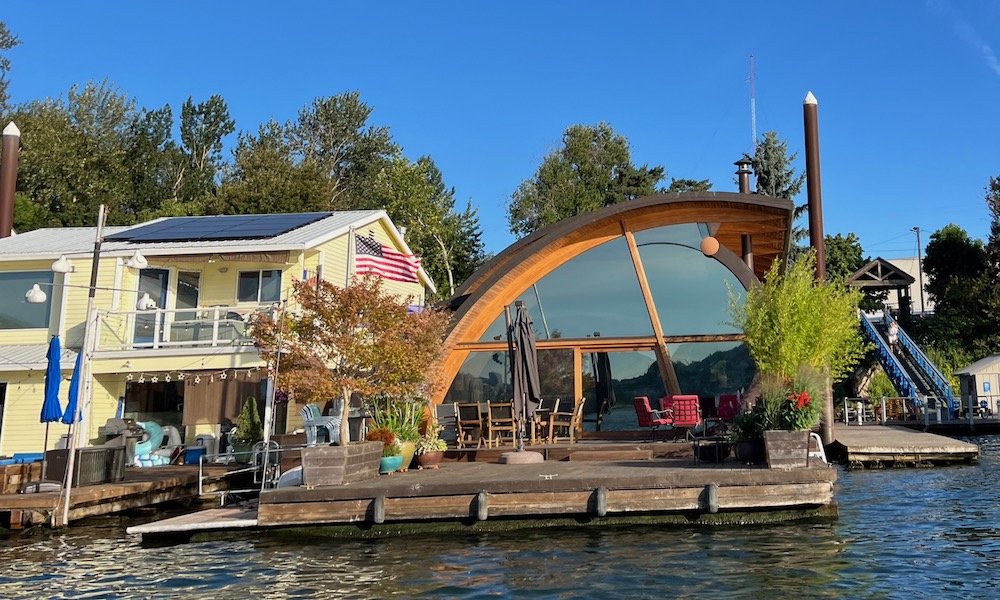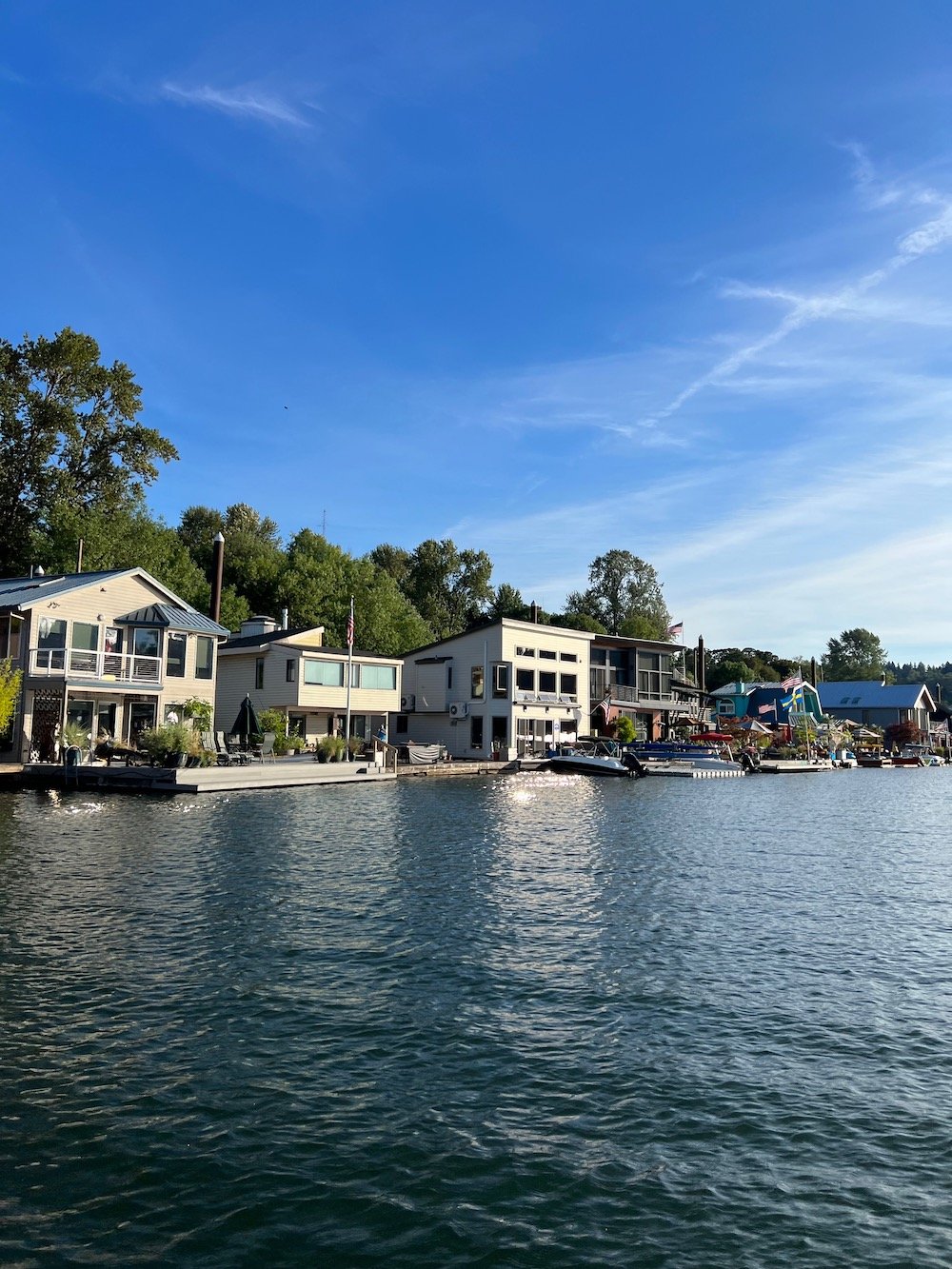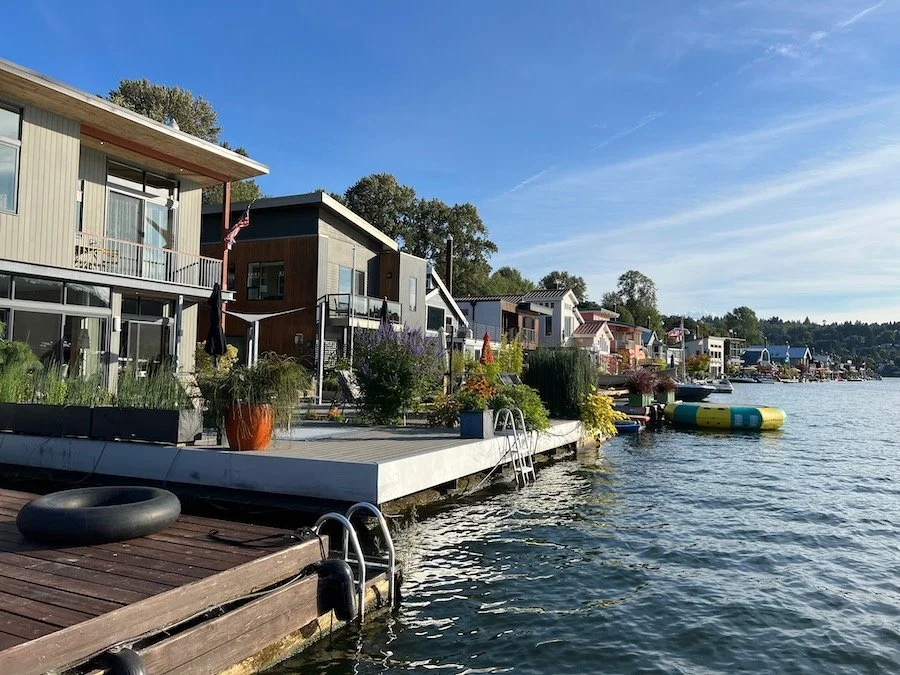Floating home pros & cons: Is it right for you?
As the founder of Flatwater Kayak Club, I've always been fascinated – er, obsessed – by the allure of living in a floating home. Can we credit the floating house in Sleepless in Seattle? Maybe. But in theory, a floating home aligns with my passion for kayaking. It sounds so serene and beautiful. I often kayak alongside floating homes in Washington and Oregon, and I can’t help but daydream…
In fact, I talk about floating homes so much these days, we’ve been seriously considering buying one in 2024, here in the Pacific Northwest. The PNW is renowned for its lush landscapes and sprawling waterways, making it a haven for those who wish to live intimately connected with nature.
I’ve kayaked past the famous “Wave house” many times on the Willamette River. You can learn more about this unique floating home architecture here.
Floating homes in this region offer a unique opportunity to be directly on the water and close to wildlife. Imagine waking up to the gentle lapping of waves against your home and having a panoramic view of serene waters – it's a dream come true for water enthusiasts. Is there anything better than pushing off your own dock for a sunset paddle down the river with a soaring bald eagle overhead??
But I know it’s a romantic notion, and the practical side of me has been doing extensive research on floating home living to see if it’s the right fit for us. I got to thinking that some of our kayaking audience may be also daydreaming about owning a floating house, so here’s some things to consider before you make the jump on such a unique, big purchase.
What is a floating home? Understanding the basics and differences from houseboats
First things first, let’s review what a floating home is – and is not. When envisioning a life intertwined with the rhythm of the water, you might come across terms like "floating home" and "houseboat." Many people use the terms interchangeably, and while they may seem similar, there are distinct differences between the two.
What is a floating home?
A floating home is essentially a house built on a floating structure, such as a pontoon, that remains stationary at a fixed location. Unlike traditional houses, these structures are anchored permanently to a specific spot on the water, usually at a dock or a pier. They are connected to land-based utilities, including electricity, water, and sewer systems.
Key characteristics of floating houses:
Stationary: Floating homes do not have their own propulsion and are meant to stay in one place.
Utility connections: They are typically connected to public utilities, similar to land-based homes.
Community setting: Often found in communities or marinas, floating homes provide a unique living experience, closely tied to the water.
Floating home vs. houseboat
Mobility: The key difference lies in mobility. A houseboat is designed to be mobile, equipped with its own means of propulsion, allowing it to navigate different waterways. In contrast, a floating home is meant to remain stationary.
Lifestyle and purpose: Houseboats are often used for leisure and travel, similar to a recreational vehicle (RV) on water. Floating homes, however, are intended for permanent residence, offering a unique day-to-day living experience on the water.
Design and structure: Houseboats tend to have a more boat-like design and construction, while floating homes resemble traditional houses in their architecture and amenities, albeit adapted for life on the water.
Understanding these differences is crucial when considering a life on the water. A floating home offers the stability and comfort of a traditional home, albeit with a unique twist, while a houseboat presents an opportunity for exploration and mobility. Both, however, promise an intimate connection with the water, aligning with the desires of many who seek a life less ordinary.
In choosing between a floating home and a houseboat, consider your lifestyle preferences, mobility desires, and the kind of relationship you wish to have with the water.
Frequently asked questions about floating homes
-
A float house is essentially a house built on a floating platform, anchored at a fixed point on a body of water. Unlike houseboats, float houses are not designed to be navigable and are intended to stay in one location. “Float house” is a term generally used in Canadian English, or other languages, as Americans often call these structures “floating homes.”
-
Floating homes stay afloat using buoyant materials like styrofoam, concrete pontoons, or hollow metal structures. These materials displace enough water to support the weight of the house, balancing it on the water surface.
-
Floating homes can be a good investment in areas where they are popular and real estate is at a premium. However, their value depends on location, maintenance, and market demand. They often appreciate slower than traditional homes and have unique maintenance costs. In the words of my own realtor - “Do you care about appreciation? Because it won’t be much.”
-
Downsides of floating homes include vulnerability to weather and water conditions, higher maintenance costs (especially for the floating structure and water-resistant materials), potential issues with utility connections, and limited financing and insurance options.
-
Yes, there are floating homes in the U.S., particularly in areas with large bodies of water like Seattle, Portland, and parts of California. These communities offer a unique waterfront living experience and are an integral part of local culture in these regions. We see them all the time while kayaking in the Pacific Northwest!
-
Some key place in the PNW include: Ballard Locks and Lake Union (Seattle) and the Willamette River and Multnomah Channel at Sauvie Island (Portland), and Lake River in Ridgefield (Washington state).
Benefits of living close to kayaking waters
For kayakers, living in close proximity to the water is a paddle lovers dream. Living in a floating home means your next kayaking adventure is just a few steps away. This accessibility encourages spontaneous paddling sessions and allows for a deeper, more frequent engagement with the sport. It transforms kayaking from an occasional activity to an integral part of daily life – and a perfect opportunity to host friends and family for a paddle and meal together.
Kayaking culture & community among floating home residents
Floating home communities often foster a strong kayaking culture. Here, you’ll find neighbors who share your enthusiasm for paddling – whether it’s kayaking, canoeing, or SUP life. It’s common to see kayaks perched alongside floating homes, ready for the next journey.
From talking with floating home owners and realtors specializing in these types of properties, these communities (called “moorages”) naturally become a hub for sharing water activity tips, routes, and experiences.
The sense of community in floating home neighborhoods is often strong, and kayaking can become a social activity. At Flatwater Kayak Club, we’ve seen how these communities can come together for group paddles or participate in club events, fostering a sense of belonging and shared passion. We love the idea of more kayaking community!
Choosing the right kayak for floating home residents
Owning a house on the water opens up a whole new world of paddling gear. No longer do you have to worry about needing a super lightweight, portable, compact kayak. You can buy your favorite gear and store your kayaks right there on the side of your house or dock.
We’d recommend talking with a local paddle shop to select the best kayak for your water environment and skill level (for example, living on a lazy freshwater river is different than a saltwater harbor).
Given the ease of access to water, versatile kayaks that cater to both leisurely paddles and longer explorations are ideal. You may even prefer a tandem if kayaking often with a partner or friend. Consideration for storage space and ease of maneuvering from your home to the water is also important (depending on the location of your floating home to water access).
Need a deeper dive on this? Check out our article on how to choose a kayak.
Environmental considerations and stewardship
Living so close to the water also cultivates a profound respect for the environment (which I especially love as a parent). As kayakers, we understand the importance of conserving our waterways.
Floating home residents often become stewards of the water, practicing and advocating for eco-friendly kayaking and lifestyle habits, and even organizing lake and river clean-up events.
Which kayak quote would you choose for this photo?
Practical considerations and tips
Living on the water comes with its unique set of considerations – from ensuring your home has a safe and secure float, to managing the ebb and flow of tides. It’s important to prioritize safety, both in your home and while out kayaking.
Integrating efficient storage solutions for kayaks and gear, while maintaining easy access, is also a key aspect of this lifestyle. We’ve found it’s really important to talk to current owners, realtors that specialize in floating homes, and research home financing, insurance, tax, and maintenance considerations.
Is a floating home right for you? Try before you buy
This is the category we’re in as potential floating home owners. Not quite ready to make the jump yet, but interested in exploring the lifestyle more and ensuring that it’s a right fit for us.
Understanding if a floating home suits your lifestyle is crucial before making the leap. Here are some ways to find out:
Rent on Airbnb: Spend a weekend in a floating home available on Airbnb to get a firsthand experience. Some moorages don’t allow for rentals, but there are some rental opportunities in the Pacific Northwest. We actually did this ourselves in July, 2024. We stayed for a few nights at a cozy floating house rental in Oregon.
Talk to Existing Owners: Engage with current floating home residents to hear about their experiences and insights. This is key, since a floating home isn’t right for everyone (think: excessive maintenance costs, vulnerability to water and weather, accessibility issues).
Read Online Blogs and Reviews: Explore blogs and reviews by floating home dwellers for a deeper understanding.
Consider Your Lifestyle Needs: Reflect on whether the unique aspects of floating home living align with your personal and family needs.
As someone in the exploratory stage of this journey, I appreciate the 'try before you buy' mentality. A floating house, while idyllic, may not be suited for everyone – and we’re not convinced yet that it’s right for us. Buying a floating home is a significant lifestyle choice that warrants careful consideration and firsthand experience.
Conclusion
The fusion of living in a floating home and indulging in flatwater kayaking offers an extraordinary way to experience the best of the PNW, maintain a great level of fitness, and live in a peaceful environment. It's a lifestyle that celebrates the tranquility of the water, the thrill of exploration, and the warmth of a community united by a deep love for kayaking.












Paddling across the glacier-clear waters of Eastern Oregon in a clear-bottom kayak under a sky full of stars is an unforgettable adventure.